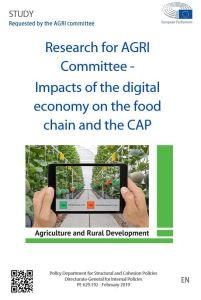
Agriculture is impacted by global trends related to demographics, economics and climate change. New emerging technologies are becoming available that can boost effectiveness and reduce risks. Consequently, a “farm-tech revolution” is emerging within the scope of global trends which generate structural changes in farms and the wider value chain in unexplored ways, comparable to what happened in the 1950s when tractors started to be used more widely, and pesticides were introduced.
The main aim of this study is to provide an overview of ways in which the “farm-tech revolution” will impact the agricultural sector in the near future, addressing the following research questions:
- What are the key technology advancements of the “farm-tech revolution” to date?
- For particular technology, what are the impacts on the evolution of agri-food chain and the vertical integration of the value chain?
- What do these disruptive technology developments imply for the modernisation of Common Agricultural Policy (CAP)?
Technology advancements: Technological developments in combination with shifts in power relationships and new business models can cause disruption in agri-food supply chains. Technologies are in this report distinguished into three main categories:
- Expected high impact on agri-food value chain: Internet of Things (IoT), Robotization, Artificial Intelligence (AI) and Big Data.
- Expected medium impact on agri-food value chain: Blockchain, Global Navigation Satellite System (GNSS) and Virtual Reality (high longer-term impact)
- Expected low impact on agri-food value chain: Broadband networks, Information and Communication Technology (ICT) and platforms for e-business, given that they are already established to high extents.
Value-chain impacts: Technology advancement includes integration of technologies in systems to enhance traceability. Often IoT, Big Data and AI are used in combination, as well as AI and robotization. Drones are often combined with satellites and Big Data.
Some applications of technologies target reduction of risks in agricultural production, such as detecting crop diseases early on in production. For instance, use of drones to create detailed soil maps for damage control, benefit the whole value chain. Some technologies target risks associated with emissions and climate change, which impact the society more broadly, including consumers and citizens.
Other applications of technologies primarily target efficiency in production, such as use of water and energy throughout the value chains. Efficiency impacts the environment and climate positively, as well as productivity.
Besides impacting vertical integration, digital technologies impact horizontal integration in the food chain, which tends to favour large food suppliers.
CAP impacts: CAP provides farmers with opportunities to adapt to new realities. Modernisation supports existing regional farm systems and specialty crops, as well as inclusiveness, integrated approaches and CAP intervention designed for regional circumstances. Smart farming can reduce environmental impacts and enhance incentives for sustainable production and new business models, with less administrative burdens. Still, there is a risk that administrative burden to farmers increases, and that improved sustainability is not obtained because available data is not used.
Full text of the study (.pdf)
Source: http://www.europarl.europa.eu/